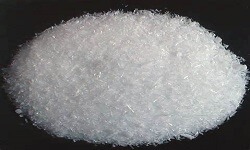IUPAC Name
Urea
Cas Number
57-13-6
HS Code
3102.10.00
Formula
NH2COONH4
Appearance
Granule or Prill
Common Names
Carbonic diamide, Carbamide, Carbonyl diamide, Diaminomethanal
Packaging
50 Kg PP Bags
Urea, also called carbamide, appears as white granules and has a chemical formula of CO(NH). It is highly soluble in water and produces a neutral solution when dissolved. It is widely used the agricultural and chemical industry as fertilizers and raw materials respectively.
Manufacturing Processes
The manufacturing process of urea involves the synthesis of this organic compound through a chemical reaction known as the urea synthesis or Haber-Bosch process. In the industrial scale, urea is produced from synthetic ammonia and carbon dioxide. The process consists of two main reactions: the first reaction leads to carbamate formation and the second reaction is the urea conversion. In the first reaction, liquid ammonia is made to react with gaseous carbon dioxide at high temperature and pressure, and ammonium carbamate is formed.
It is widely used in the agricultural industry as fertilizers due to it having the highest nitrogen content among all solid fertilizers. It is also used as a component of animal feed to promote growth in farm animals.
It is used as raw materials for the production of chemicals used in marine plywood such as urea-formaldehyde resins and urea-melamine-formaldehyde.
Urea is used to manufacture urea nitrate for applications such as explosives. It is also used in cosmetic products such as moisturizers, hair conditioners, skin creams etc. Furthermore, it is also to reduce the emission of NOx pollutants in vehicle exhaust systems.
